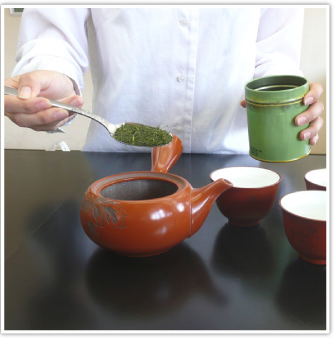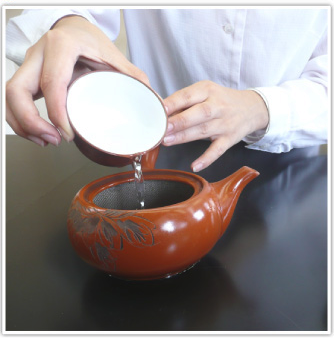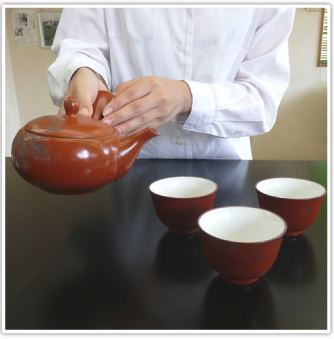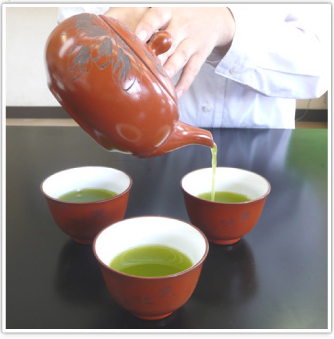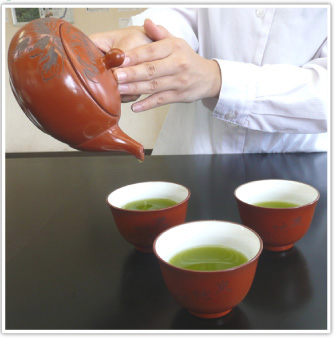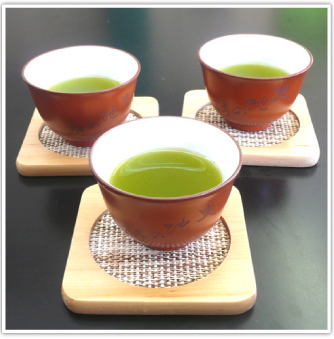How to Brew Tasty Japanese Green Tea
Art of brewing Japanese Green Tea
Japanese green tea can be brewed in many number of ways. In this article, we will go over the Simple Way and the Advanced Way for brewing tasty green tea. The Simple way is how most Japanese people consume green tea every day; the Advanced Way is what is being followed by professional green tea producers who recommends the best approach for brewing the most tasty Japanese green tea.
We recommend to start with the simple way, and enjoy the approach for the Advance Way after trying out simple ways to appreciate the difference in taste and aroma that it brings.
How to Brew Tasty Japanese Green Tea - The Simple Way
This approach does not require any special equipment such as tea pot. You can use any type of mesh strainer to filter the green tea.
- Dissolve 7g (1.5 teaspoon) of powder into 350 ml (1.5 cup) of hot water. We recommend about 80°C for most common green tea. (Please note that our product page has different recommended temperature based on type of tea between 75°C - 85°C; however, 80°C can be the most common and standard temperature that would work for any type of our green tea)
- Wait for 60 seconds
- Use mesh strainer to filter out the green tea leave and serve hot
How to Brew Tasty Japanese Green Tea - The Advanced Way
|
1. Selecting the right tea pot This approach requires a Japanese Tea Pot. There are different types of tea pots, but for our green tea which are deep steamed green tea (Fukamushi-cha), we recommend Fukamushi teapot which is made specifically for Deep Steam Green Tea. Characteristic of Fukamushi tea pot is that it has finer mesh to be able to capture finer tea leaves as Fukamushi tea usually contains finer tea leaves than other types of green tea. The picture shown is 370cc Fukamushi Tea Pot. If you do not have access to Fukamushi Tea Pot, you can use any type of tea pots, but try to find ones with finer mesh. |
|
2. Selecting and boiling water the right way Water is essential when brewing green tea. It is the best to use soft water with less mineral to get the best result. Hard water with mineral breaks down elements in green tea which breaks the taste. If you have access to water softer filtering system, use water filtered by them. If using bottled water, do not use the ones with "Added Mineral". Evian tends to be recommended ones as they are known for soft water. Boil water until 100°C for 4-5 minutes and cool down to 80°C. By boiling water first, it removes the smell of chloride. (Please note that our product page has different recommended temperature based on type of tea between 75°C - 85°C; however, 80°C can be the most common and standard temperature that would work for any type of our green tea) This approach in Japanese is called "yuzamashi" which translates to "cooled-down" water. |
|
3. Put green tea Please adjust the amount of tea leaves according to your favor and the tea pot which is using.
|
|
4. Put hot water Pour boiled water (350ml) which has cooled into the tea pot. Trick is to fill the tea pot with 70% full of hot water. By doing so, it spreads the scent to the remaining 30 percent of the tea pot which then pours in to the tea cups.
|
|
5. Rotate tea pot Rotate the tea pot slowly for about 60 seconds. This allows green tea to open up and soak through hot water evenly.
|
|
6. Pour green tea to cup When pouring green tea to multiple tea cups, do not pour one by one (cup 1-> cup 2-> cup 3). By doing so, green tea in cup1 is lighter than cup 3 since the darker element of green tea tends to sit at the bottom of the tea. Pour little by little by rotating each cup. (cup 1->cup 2-> cup 3-> cup 1-> cup 2-> cup 3). For 370cc tea pot in the cup, rotate about 3-4 times between cups. This action makes each cups to taste the same.
|
|
7. Pour until the last drop Please pour to the last drop. The later drops tends to be darker in color. The last drops have the most amount of aroma and elements so you do not want to miss out on the best part.
|
|
8. Enjoy! Hope you enjoy our mellow and tasty Japanese Green Tea poured with traditional Japanese way.
|
Other Points to Consider
Enjoy the Second Infusion
In Japan, it is common practice to do 2nd infusion to get 2nd cup. You can use the same green tea after pouring the first cup, and infuse one more time. The first infusion is called "Issenme", the second infusion is called "Nissenme". In order to get tastier 2nd infusion follow below steps.
- After the infusion, open the top of the tea pot and let go the hotness inside the pot. If you don't do so, the tea leaves inside the pot get warmer and cause to reduce the taste in the 2nd infusion.
- Follow above steps except that you want to wait for 10 seconds rather than 60 seconds after pouring hot water. Use higher temperature for the 2nd fusion.
Relationship between tea and temperature of water
When the temperature of water is high, green tea gets bitter and change the balance of the taste. So, it is important to boil water and cool it for some extent based on the bitterness you prefer.
When the temperature of water is higher than 80oC, the taste gets bitter and has more astringent.
When the temperature of water is below 60oC, the taste is less bitter.




